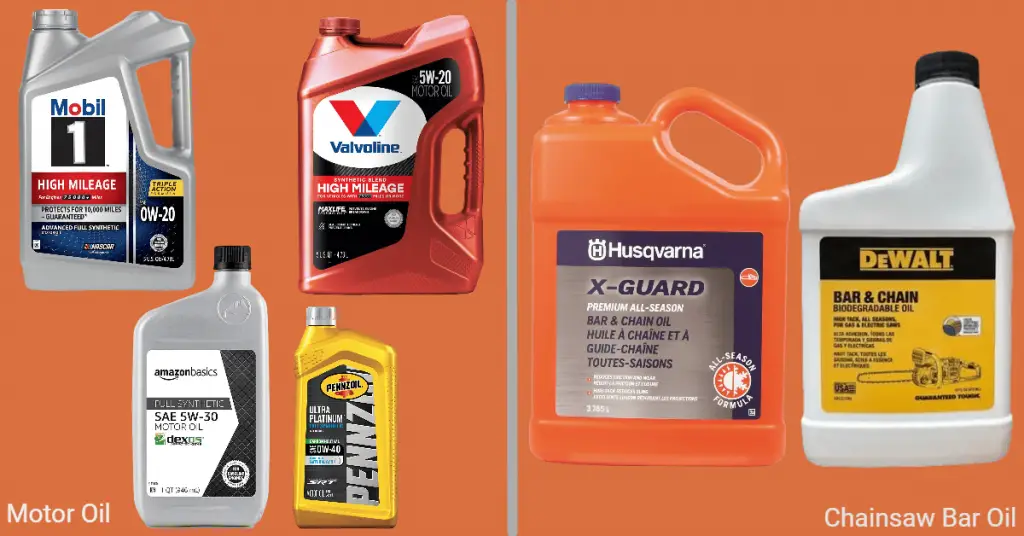Motor Oil vs Chainsaw Bar Oil [11 MAJOR Differences]
To lubricate a chainsaw, it is best to use the recommended bar and chain oil. Bar and chain oil is specifically designed to have the right viscosity and “tackifier” properties to adhere to the bar and chain, providing proper lubrication and reducing wear and tear. Motor oil, on the other hand, is not as sticky and may not provide adequate lubrication for the chainsaw’s high-speed operation. It can cause damage to your engine or chain. Your engine will still work, but then you would spend a lot of money replacing either the chain or motor oil now and then.
If you are a handyman or a one-off Chainsaw user, I am sure you know that chainsaw bar oil lubricates and protects the chainsaw and makes it function at a top level for a long time, but it is not the same as motor oil.
In fact, it is much different. But what are the differences between the two, and which one do you use?
The motor oil and chainsaw bar oil debate has been very enduring, and this article will unravel the key differences between them and which one is better when poured on the chainsaw chain.

Buying a chainsaw is one thing, but maintaining it is another thing, and oiling the bar is one of the pertinent things to do to keep the health of the chainsaw engine in good condition.
The Motor oil vs. Chainsaw bar oil debate
While comparing the chainsaw bar oil with the motor oil, it is safe to check their efficiency when used in a chainsaw.
Firstly, the chainsaw bar oil is more recommended for use in a Chainsaw because of its ability to maintain the engine and the chain’s health.
The motor oil is not ideal for a chainsaw as a lubricant because it acts as an abrasive.
This is because of its metallic contents, which adversely affect the chainsaw chain.
These metallic items are even more dangerous since they are microscopic; they cannot be seen with the eyes.
They stick on the chain and adversely affect free movement.
Besides, the viscosity of the motor oil is in tandem with the required viscosity for chainsaw lubricants.
In summary, don’t use motor oil in your chainsaw to avoid damage to your engine or chain.
Your engine will still work, but then you would spend a lot of money replacing either the chain or motor oil now and then.
![[infographic] Motor Oil vs Chainsaw Bar Oil](https://chainsawnerds.com/wp-content/uploads/2021/06/Motor-Oil-vs-Chainsaw-Bar-Oil.png)
The Chainsaw Bar oil Features
1
The chainsaw bar oil is devoid of additives, whereas additives are major constituents of the motor oil.
The motor oil is akin to cooking oil, as it sticks to metals and does the same on the chain.
Motor oil is commonly found in automobile shops in cities, but chainsaw bar oil is sold in more specialized shops.
2
Getting a chainsaw started, especially in the winter, can be difficult when it is old or rusted.
So, rather than struggle with a stubborn chainsaw all season, give it some help with some chainsaw oil.
Chainsaw oil helps lubricate any rusted, cold, or old gears in the chainsaw, allowing for a quicker and cleaner start every time.
3
The Chainsaw bar oil is perfect for both new and old chainsaw engines.
It assists in prolonging the life of a new chainsaw, reduces friction, adds more verve, and increases the cutting speed to get the job done within the shortest possible time.
4
The chainsaw bar oils are customized for chainsaws.
Their formulation is specifically tailored toward boosting the life of the chainsaw and other chain-propelled machines.
It is a mixture of minerals and specially formulated oil for lubricating the chain and bars of Chainsaws.
5
In addition, there are additives to curb wear and tear, rusting, and corrosion.
6
It is ideal for all weather conditions as the temperature ensures good viscosity and flow during winter and summer.
7
The Chainsaw bar oil does not produce residues during lubrication.
Electrically powered chainsaws can use it, likewise gas-powered chainsaws.
Users can easily pour it on the oil tank, and the bar oil creates a film around the chainsaw chain to curb friction during movement.
8
The chainsaw bar oil does not heat up as its temperature remains steady to avoid damage to the engine.
9
The Chainsaw bar oil adheres firmly on metallic surfaces.
They don’t evaporate or drain away from the chain during use.
They stick to the chain and guide bars, keeping it safe and well-protected. They have a reduced pour point.
The Motor Oil Features
1
In the past, motor oil was the darling of chainsaw operators.
It served as the most popular oil for lubricating engines and chains, but this changed in the long run.
Today, Motor oil is only perfect for cars and motor engines, not chainsaws.
2
No professional will recommend using motor oil for your chainsaw or any chain-powered machine.
This is because of the metallic contents in the motor oil.
They are abrasives and can quickly degrade your chain, thus calling for more expenses.
3
The motor oil does not contain the sticky additives that keep that chainsaw bar oil firmly on the chainsaw.
The motor oil is a broken oil that will not stay on the chainsaws long. Hence, they cannot lubricate for long hours.
4
If you use motor oil on your chainsaw, you will end up spending more money because the oil will not stick to the chain; hence you need to replace the oil more frequently.
5
The motor oil will spat and spill on other parts like the gear. Hence, you will spend lots of effort cleaning the machine.
6
Motor Oil is strictly an engine oil that protects and lubricates the engine and internal combustion section of cars. It is suitable only here.
7
It is composed of base oils, anti-wear substances, additives that stifle the effect of detergents in the engine, and dispersants.
8
The Motor oil is not designed for chainsaws and guide bars. It is rather an engine protector.
It fights sludge via the dispersants and quells the negative impacts of detergents via the varnish.
9
The engine oil effectively quells the negative effects of acids that emanate from fuel and anti-oxidants.
It is also a booster for piston rings and a corrosion and oxidation inhibitor.
It is also a heat carrier within the confines of the engine. By so doing, it assists in cooling the engine and maintaining the temperature.
There is no such necessity in chainsaw as the oil here only to lubricate the bar.
Frequently asked questions
Still have questions?
If you cannot find an answer to your question in our FAQ, you can always contact us
and we will be with you shortly.
Final Thought
To wrap it up, it would be fair to say that both Chainsaw bar oil and motor oil are excellent lubricators.
While bar oil is perfect for chainsaws and guide bars, motor oil is excellent in protecting combustion engines.
It is a matter of usage; I hope you are now aware of the differences and similarities between these two professionally-blended lubricants.






